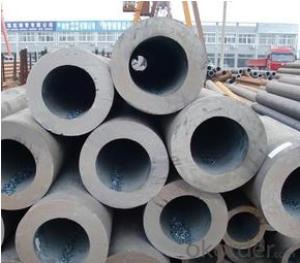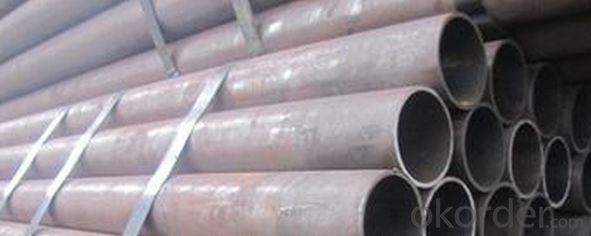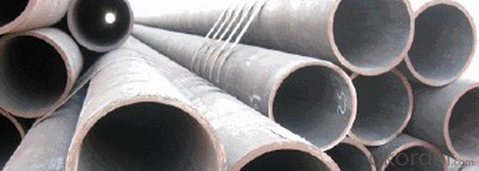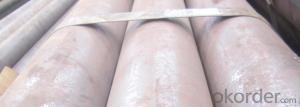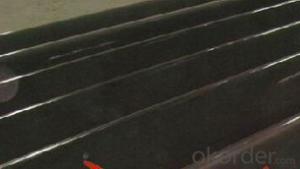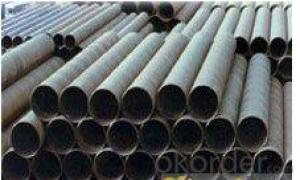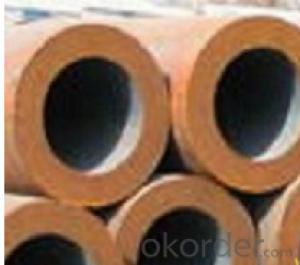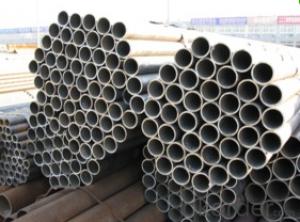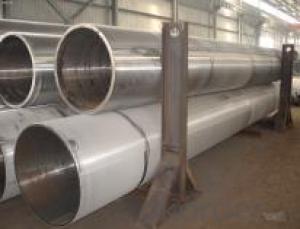Schedule 40 Seamless Carbon Steel Pipe API L80 CNBM
- Loading Port:
- Qingdao
- Payment Terms:
- TT OR LC
- Min Order Qty:
- 10 pc
- Supply Capability:
- 30 pc/month
OKorder Service Pledge
OKorder Financial Service
You Might Also Like
Quick Details
| Thickness: | 1.73 - 59.54 mm | Section Shape: | Round | Outer Diameter: | 10.3 - 914.4 mm |
| Secondary Or Not: | Non-secondary | Application: | Fluid Pipe | ||
| Technique: | Hot Rolled | Certification: | API | Surface Treatment: | Galvanized,vanish covering, black painting, galvenized ect. |
| Special Pipe: | API Pipe | Alloy Or Not: | Non-alloy | Length: | 5-12m as per customer's requirements |
| SCH: | SCH10~160, STD, XS & XXS | Payment Terms: | L/C T/T | Supply Ability: | 5000 Ton/Tons per Week |
| Product: | pipe prices | Grade: | 10#,20#,45#,A106(B,C),A53(A,B),12Cr1MoV,12Cr1MoVG,12Cr2Mo,13CrMo44,13CrMo45,15CrMo,15CrMoG,St52,St52.4,10#-45#,A53-A369,Cr-Mo alloy,ST35-ST52 | Standard: | API 5CT,API 5L,ASTM A106-2006,ASTM A53-2007,DIN 17175,GB 3087-1999,GB 5130,GB 6479-2000,GB 9948-2006,GB/T 17396-1998,GB/T 5312-1999,GB/T 8162-1999,GB/T 8163-1999,API,ASTM,DIN,GB |
Packaging & Delivery
| Packaging Detail: | By bundles, seaworthy wooden cases, steel framed cases, and simple packaging or according to the demand of the customers. |
| Delivery Detail: | within 5-15 days |
Specifications
1.pipe prices
2.Supply Ability:5000 Tons per Week
3.Payment Terms:L/C T/T
High quality Carbon steel pipe, Best pipe prices
1) Application: Overheat pipe for low and mediumpressure boiler,boiling water pipe, locomotive smoke pipe(big and small),Carry gas ,water or oil in the industries of petroleum and natural gas etc
2) Materials: 10#, 20#, 45#, 15CrMo, 12Cr1MoV, 13CrMo44, 12Cr2Mo, 13CrMo45, 12Cr1MoVG, 15CrMoG, API J55, API K55, API N80, API L80, API P110
3)Pipe according to standard: GB 3087-1999, GB/T 8163-1999, GB/T 8162-1999, GB 9948-2006, GB/T 17396-1998, GB/T 5312-1999, GB 6479-2000, GB 5130, DIN 17175, API 5CT, API 5L .
4)Packing: By bundles, seaworthy wooden cases, steel framed cases, and simple packaging or according to the demand of the customers.
Technical Parameters of Seamless Steel Pipe
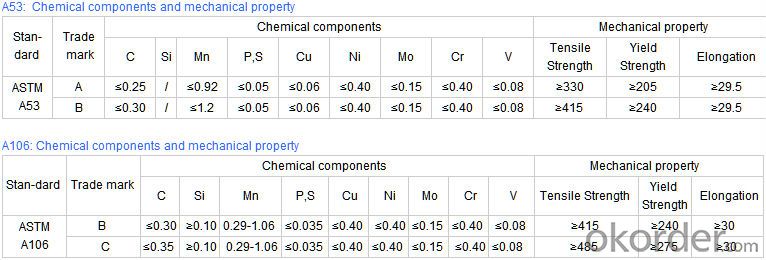
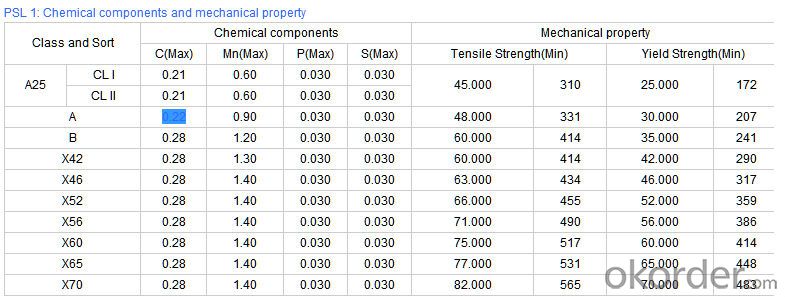
- Q: How do steel pipes perform in high-altitude applications?
- Steel pipes perform well in high-altitude applications due to their inherent strength and durability. The high tensile strength of steel allows it to withstand the harsh conditions and extreme temperature variations experienced at high altitudes. Furthermore, steel pipes are resistant to corrosion, making them suitable for use in high-altitude environments where exposure to moisture and atmospheric gases is common. Overall, steel pipes are a reliable choice for various high-altitude applications, including oil and gas transportation, construction, and infrastructure development.
- Q: What is the weight of a steel pipe?
- The weight of a steel pipe can vary depending on its dimensions and thickness.
- Q: How are steel pipes used in the textile industry?
- Steel pipes are used in the textile industry for various purposes, including the transportation of water, steam, and chemicals, as well as for the distribution of compressed air. They are also used in the construction of machinery and equipment, such as dyeing machines and fabric stretching frames. Additionally, steel pipes are utilized for the installation of heating and cooling systems in textile factories.
- Q: What are the different methods of bending steel pipes?
- There are several methods of bending steel pipes, including hot bending, cold bending, induction bending, rotary draw bending, and hydraulic pipe bending.
- Q: What is the hardness of steel pipes?
- The hardness of steel pipes varies depending on the specific grade and manufacturing process used. However, steel pipes are generally known for their high hardness and durability, as they are often designed to withstand heavy loads, abrasive environments, and high-pressure conditions.
- Q: What is the difference between hot-dip galvanizing and electroplating of steel pipes?
- Hot-dip galvanizing and electroplating are two different methods of applying a protective coating to steel pipes. Hot-dip galvanizing involves immersing the steel pipes in a bath of molten zinc, which creates a thick, durable coating that provides excellent corrosion protection. On the other hand, electroplating involves passing an electric current through a solution containing zinc ions, which causes the zinc to bond to the surface of the steel pipes. While electroplating can provide a thinner coating, it is generally less durable and may require additional layers or coatings for sufficient corrosion resistance.
- Q: How are steel pipes used in the telecommunications infrastructure industry?
- Steel pipes are commonly used in the telecommunications infrastructure industry for various purposes such as supporting overhead cables, protecting underground cables, and providing structural stability to transmission towers and equipment.
- Q: How are steel pipes repaired in case of damage?
- Steel pipes can be repaired in case of damage through various methods such as welding, patching, or using clamps. The specific repair technique depends on the type and extent of the damage.
- Q: Are steel pipes suitable for underground nuclear waste storage?
- Yes, steel pipes are suitable for underground nuclear waste storage. Steel pipes are known for their durability, strength, and resistance to corrosion, making them an ideal choice for safely containing and transporting nuclear waste underground. Additionally, steel pipes can withstand the high pressures and temperatures associated with nuclear waste, ensuring the integrity of the storage system.
- Q: Are steel pipes suitable for potable water systems?
- Yes, steel pipes are suitable for potable water systems. They are known for their durability, strength, and resistance to corrosion, making them an excellent choice for transporting and distributing clean drinking water. However, it is important to ensure proper coating and maintenance to prevent any potential contamination or degradation of water quality.
Send your message to us
Schedule 40 Seamless Carbon Steel Pipe API L80 CNBM
- Loading Port:
- Qingdao
- Payment Terms:
- TT OR LC
- Min Order Qty:
- 10 pc
- Supply Capability:
- 30 pc/month
OKorder Service Pledge
OKorder Financial Service
Similar products
Hot products
Hot Searches
Related keywords
